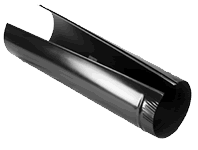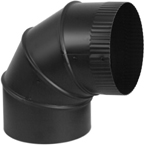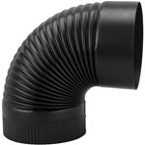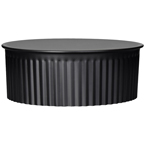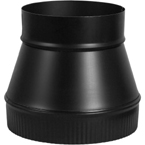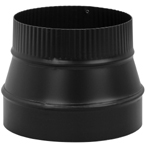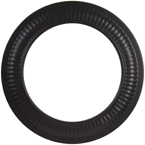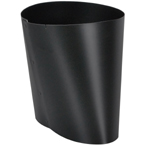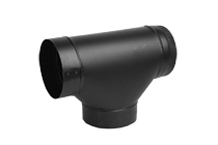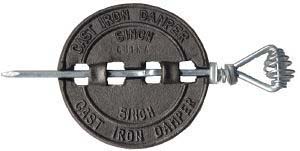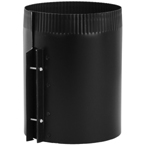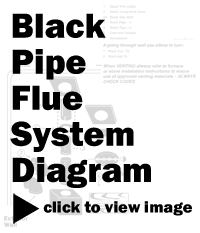7 Inch Black Stove Pipe
Economical, high
quailty stove pipe (also called connector pipe) used to attach
a stove to a chimney. This regular 24 gauge stovepipe is for
Wood, Oil, Coal, or Gas fuels. The smaller the gauge, the thicker the metal. 24 is the accepted standard.
-
24-Gauge
-
Three
stovepipe screws create secure connections between
pipes.
-
18"
clearance to combustibles
-
National
code prohibits enclosed pipe installations
-
National
code requires stovepipe to exit the room that
it originates in, prohibits stovepipe from penetrating
combustable material
12" Straight
Pipe
Self-locking
pipe presses together until it snaps. No tools needed
to close seams. Joint can be cut to any length. |
|
|
| |
24" Straight
Pipe
Self-locking pipe presses together until it snaps.
No tools needed to close seams. Joint can be cut to any
length. |
|
| |
Adjustable Elbow
Can quickly be adjusted to a straight line, 45 degree angle, or a right angle. |
|
| |
|
90° Elbow
Corrugated lock seamed, one piece construction. Lock seamed for strength and to prevent coming apart. 2 1/2" ends.
|
|
| |
Trim Cap
Used to close off one end of a stove pipe tee. Use of a tee cap allows for easy access for pipe cleaning. |
|
| |
Increaser From 7" to 8" pipe
Easily adapts smaller stove pipe to larger stove pipe. Large end of Increaser is crimped. |
|
|
| |
Reducer From 7" to 6" pipe
Easily adapts large stove pipe to smaller stove pipe. Small end of Reducer is crimped. |
|
| |
Draw Band Connector
is used when the flue collar of a stove is a bit too big.
|
|
| |
Trim Collar
Covers excess area around flue opening. Provides a finished
look to stove pipe installation. |
|
| |
Oval to Round Boot
is 7" high with a 6" round end. The oval end is approximately 8-1/4" X 6-3/16". |
|
|
| |
Tee Joint
Both sections assembled with "Snaplock" seam. Can be easily turned to make a secure lock. |
|
| |
Stove Pipe Damper
Usually located approximately 12 to 18 inches from the stove, prior to the spot where the pipe exits into a chimney, if present. The damper retains heat that escapes up the chimney or flue. |
|
| |
| |
| 1.
Stick with one brand of stovepipe for connecting woodstoves to chimney.
This ensures the most secure stovepipe connection. Learn
why a good stovepipe connection is so important.
2. For most stovepipes 3 screws are required to fit each pipe connection
tightly
3. New stovepipe and woodstove instalations may smoke a little and emit
an odor when first used. This is normal curing of the paint on the pipe.
Allow ventalation of an open a window or door to allow the smoke and
fumes to escape during the beginning of your first wood burning stove fire.
Never use stovepipe as a chimney or pass it through an unprotected wall.
Return to top of page
|

